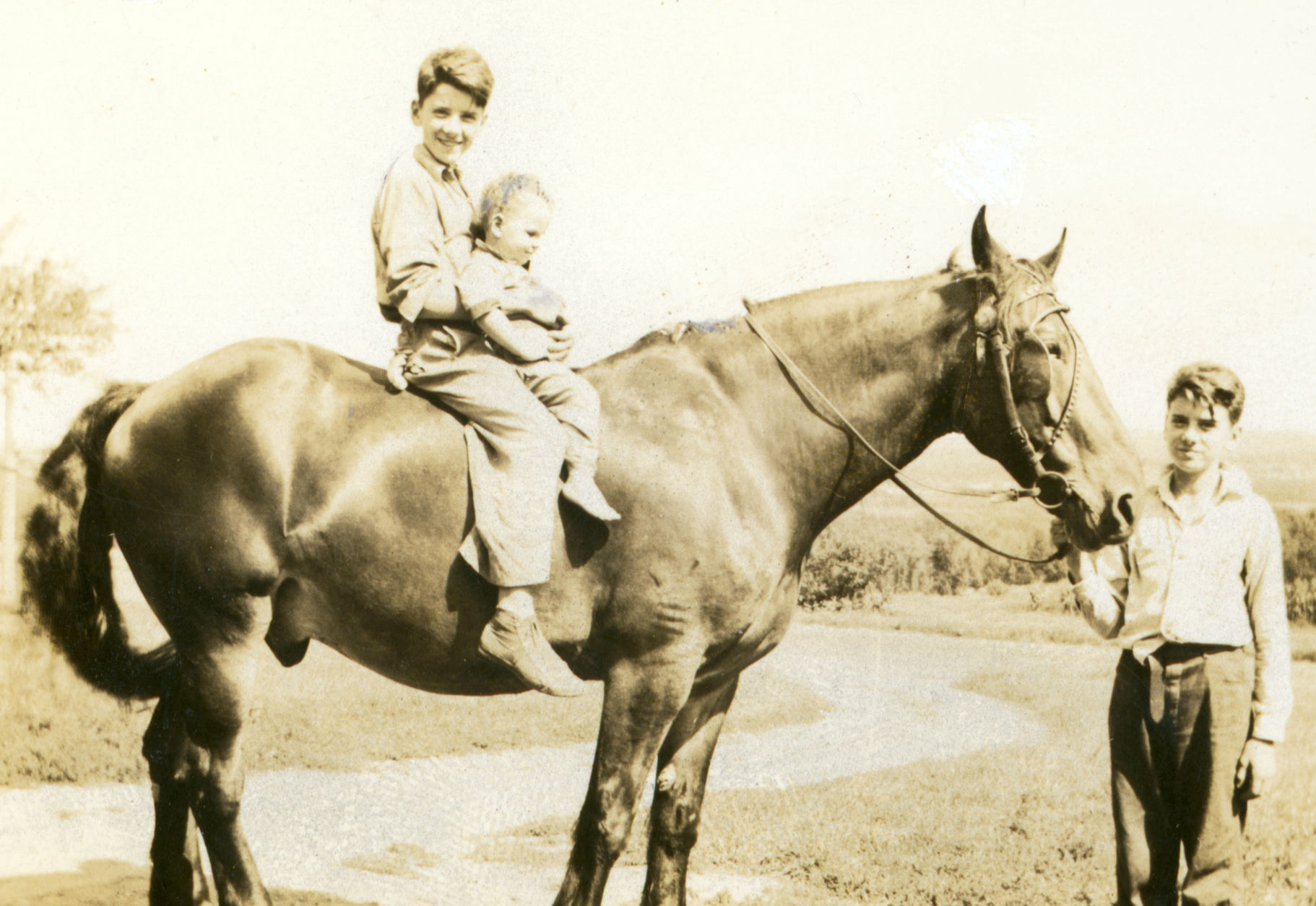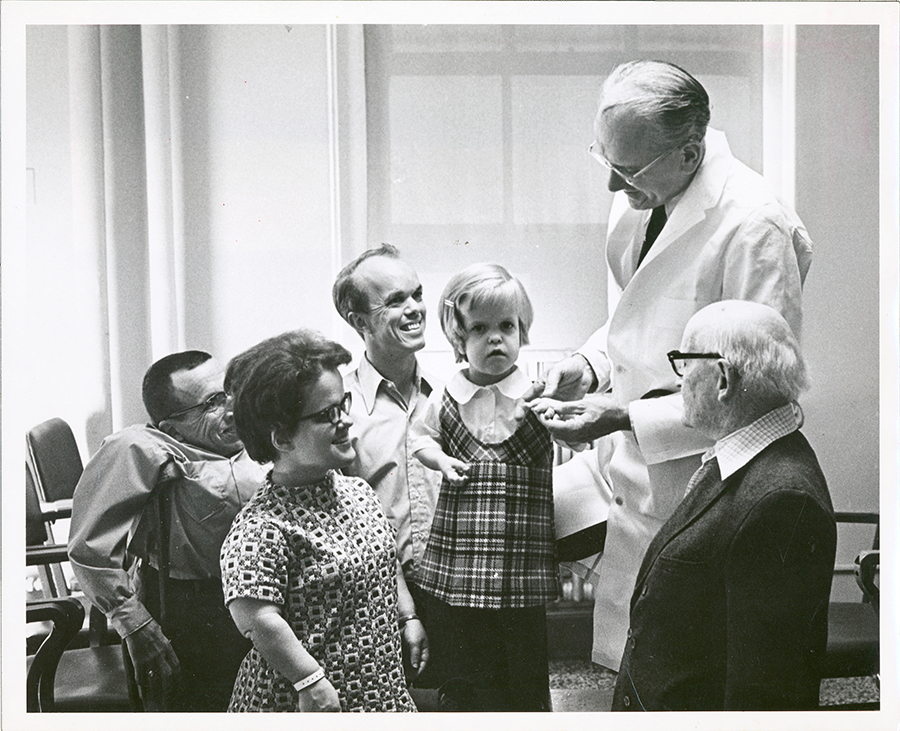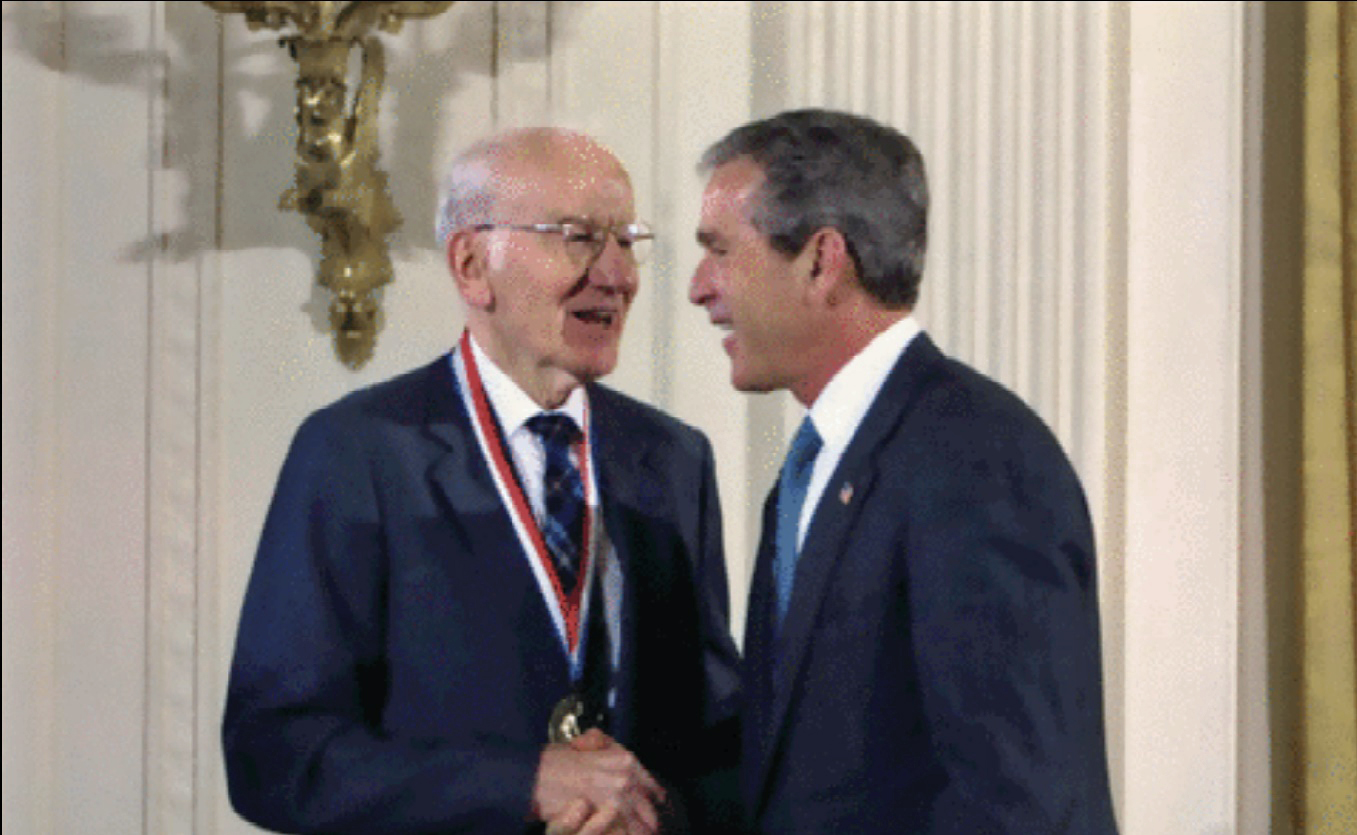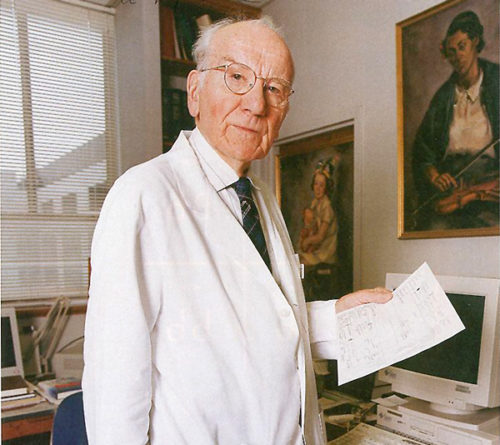Victor McKusick: Medical Genetics
Continuing our historical description of the top 50 most influential doctors in history we come to #44, Victor McKusick known as the father of medical genetics. Can you even comprehend what it means to have been the “inventor” or “founder” of an entire field of medicine? I’m not sure I can.
Dr. Victor McKusick, Founder of Medical Genetics
Victor McKusick (1921-2008) – #44
Meticulous Researcher, Compassionate Clinician
Most of the previous physicians we’ve listed so far, in this quiet stroll through physicians we we all owe a debt of gratitude, have lived their lives or accomplished their notoriety before my time. No so with Dr. McKusick. He didn’t die of cancer until 2008 so was publishing his greatest work about the time I was in medical school.
I guess you’d say he was sort of a “contemporary” of mine; but, frankly, I was so busy trying to keep my head above the water that I didn’t realize a whole new branch of medicine was being founded.
Early Life and Education of Victor McKusick

Victor and his twin were born Oct. 21, 1921 in Parkman, Maine to two former teachers turned dairy farmers and were raised in a family of five children who all considered obtaining a good education a high life’s priority.
Before deciding on the farm life for their family, his father had graduated from Bates College and was a high-school principal in Chester, Vermont. His mother had taught elementary school.
Even by 1927 the “citified” life hadn’t reached that far into Maine and he attended grammar school in a one-room schoolhouse having the same teacher for seven of the eight years he was there.

As a child he said that he had planned to become a minister until the summer of 1937 when, at age 15, he developed a spreading streptococcal infection of his axilla and upper arm requiring transfer between hospitals and ten weeks in Massachusetts General Hospital on the early antibiotic Sulfanilamide.
In later life he quipped about his severe “microaerophilic Streptococcus infection in my axilla” and posited “Perhaps I would have ended up a lawyer if it weren’t for the microaerophilic streptococcus.”
College and Medical Training
Finishing high school, Victor went to Tufts University from the fall of 1940 to the summer of 1942. Tufts had a medical school but he liked the medical research being done at Johns Hopkins. When, because of the war, he found he might be able to enter Johns Hopkins early… well, the deal was sealed.
During WW-II Hopkins couldn’t fill it’s med school classes so for the first and only time it would accept students without a BS degree and Victor applied after only 3 years and was accepted. Then he earned his MD after only three years in an accelerated program.
And to cap it off, two years younger than “regular” MDs, he was offered the prestigious William Osler Internship in Internal Medicine at Johns Hopkins which ended up permanently sealing his relationship with the institution.
He completed his residency training as a cardiologist, the department of genetics did not exist at the time, specializing in heart murmurs, and innovated the use of the spectroscope to analyze heart sounds.
Later Life and Medical Career
In 1949, he married fellow physician Anne Bishop, a Rheumatologist at Hopkins and had three children.
Dr. McKusick had a prodigious memory for clinical and scientific details which would continually astonish his countless students, patients and colleagues. He kept meticulous records of his ever increasing queries into medical problems which drew him praise as an avid historian in the field he helped define.
As a cardiologist he worked with heart defects which seemed, to him, to be frequent in unusually tall statured people and began noticing other commonalities as well. One such patient had a weakening of the aorta and detached retinas which, of course, “detoured” him into looking for other commonalities in other patients.

When he found them, he studied their family histories and believed they had to be a complex group of symptoms linked to a single inherited gene…and he was proven correct. The weakening of the aorta and detaching of the retinas seemed, to him, to go along with a possible connective tissue disorder which linked to their abnormally long limbs. Other patients with Marfan syndrome sought him out eventually marking him as the leading expert in the syndrome.
That path then captured his full-time attention and he went on to examine other populations with relatively isolated gene pools. A colleague called his attention to people of short stature within the Amish community and he became the expert on that issue as well.
In fact, his study of genetics among the Amish is perhaps his most famous of his research where he also set the stage for the kind of meticulous but unrelentingly sensitive information gathering important for the work and eventually copied by others in the field.
Publications and Awards

His meticulous notes and inspiring memory for detail led to the 1966 publishing of his book “the Mendelian Inheritance in Man,” commonly known as simply “MIM.” It was the first catalog of ALL known genes and genetic disorders
He placed the book online for everyone to use and it has now become the definitive source of information for human genetic disorders currently maintained by the National Library of Medicine.
He was a proponent of completely mapping the human genome 34 years before the feat was achieved in 2003. He started one of the first medical genetics clinics in this country and founded the annual “short course on medical genetics” which has updated and trained thousands of physicians in the field.
Dr. McKusick received more than 20 honorary degrees and numerous international prizes including the US National Medical of Science in 2002 and the 2008 Japan Prize in Medical Genomics and Genetics. He was the founding president of the Human Genome Organization, a member of the National Academy of Sciences and co-founded Genomics in 1987.
Later life and death
Eventually he resigned his many appointments to practice clinical medicine and lecture. He also led a Congressionally-chartered committee examining the ethics of testing Abraham Lincoln’s tissue for the presence of Marfan syndrome genes.
He died of cancer at the age of 86, July 22, 2008, at his home in Towson, Maryland, right outside of Baltimore. On the 21st, the day before he died, he watched a live-stream of a course on medical genetics from Bar Harbor, Maine, which he helped found and direct in 1960.
Biographic Summary
Victor Almon McKusick was an American internist, cardiologist and founder of the field of medical genetics.
Born: October 21, 1921,
Died: July 22, 2008,
Education: Tufts University, John Hopkins School of Medicine,
Known for: being the “father of medical genetics”
Books: Mendelian Inheritance of Man
25 Posts in Top 50 Doctors (top50) Series
- 27 - Charles D. Kelman - Cataracts – 9 Mar 2023
- 28 - Cicely D. Williams, Kwashiorkor, Breastfeeding, Whistleblower – 21 Jun 2022
- 29 - Dame Cicely Saunders, Hospice – 23 Apr 2018
- 30 - David L. Sackett, Evidence-based Medicine – 2 Apr 2018
- 31 - E. Donnall Thomas & Joseph Murray, Bone Marrow Transplants – 23 Feb 2018
- 32 - Elizabeth Blackwell, women in medicine – 29 Jan 2018
- 33 - Elisabeth Kübler-Ross, stages of grief – 5 Jan 2018
- 34 - Watson & Crick, DNA – 2 Dec 2017
- 35 - Mahmut Gazi Yaşargil, Micro-Surgery – 24 Oct 2017
- 36 - George Papanicolaou, Cytopathology, Cancer – 29 Sep 2017
- 37 - Dr. James Parkinson, Parkinson's Disease – 1 Sep 2017
- 38 - Dr. John Snow, cholera – 20 Aug 2017
- 39 - Dr. Joseph Kirsner, GI Joe – 27 Jul 2017
- 40 - Lawrence (Larry) Einhorn, chemotherapy – 16 Jun 2017
- 41 - Robert Koch, modern bacteriology – 21 Mar 2017
- 42 - Stanley Dudrick, TPN – 28 Feb 2017
- 43 - Stanley Prusiner, neurodegenerative diseases – 25 Jan 2017
- 44 - Victor McKusick, medical genetics – 3 Jan 2017
- 45 - Virginia Apgar, anesthesiology & newborn care – 12 Nov 2016
- 46 - William Harvey, circulation – 12 Oct 2016
- 47 - Zora Janžekovič, burns – 26 Sep 2016
- 48 - Helen Taussig, blue babies – 3 Sep 2016
- 49 - Henry Gray, anatomy – 3 Jul 2016
- 50 - Nikolay Pirogov, field surgery – 11 Jun 2016
- Top 50 Doctors: Intro/Index – 10 Jun 2016

